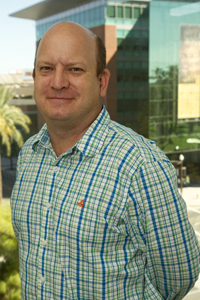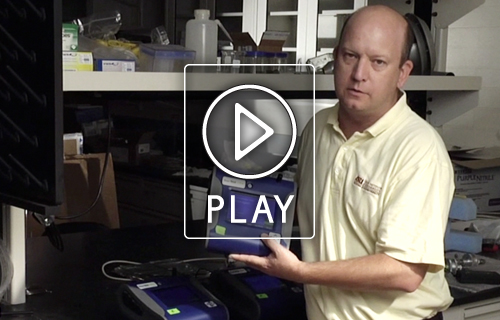|
September 30, 2010
Dear Board Member,
This month we are featuring Dr. Matt Fraser, an expert on urban air quality and director of research development for the Global Institute of Sustainability. Professor Fraser’s video interview follows a brief list of news and activities, below.
Highlights of ASU sustainability activities
ASU’s School of Earth and Space Exploration is offering a new undergraduate degree focused on the concepts of earth systems science and sustainable natural resource management to prepare students for green-collar careers in industry, nonprofit organizations, and government. Students who complete the B.A. in Earth and Environmental Studies will be scientifically literate in the workings of the natural world. The program is also designed to be suitable as a double major with a B.A. or B.S. in Sustainability. Read more. -
ASU has been named as one of 10 leaders of the Changemaker Campus Consortium established by Ashoka, a global association of leading social entrepreneurs that operates in 60 countries on five continents. The Changemaker Campus Consortium promotes social entrepreneurship education as a means to help students develop innovative and sustainable solutions for real world challenges in communities around the world. Read more.
-
Faculty members from the Consortium for Science, Policy, and Outcomes (CSPO) traveled to France in late August to collaborate with the Institut des Hautes Études pour la Science et la Technologie (IHEST) in a series of meetings to help government officials from across France learn how to involve the public in science policy decisions. CSPO’s Dan Sarewitz, Jamey Wetmore, and Mark Brown blogged from their multi-day meeting with French policymakers and scholars. Read more.
-
An ASU archaeologist is co-leading an international project to identify and sustain cultural sites and associated natural resources in China. Michael Barton, professor in the School of Human Evolution and Social Change, has been teaching Chinese scientists how to apply advanced technologies in digital mapping and geographic information systems to pinpoint remote archaeological sites and improve the country’s cultural and natural resource management practices. Read more.
-
ASU research on commercializing algae fuel production played a role in developing the fourth annual Algae Biomass Summit, which has been taking place in Phoenix Sept. 28th to 30th this year. As part of the event, ASU has collaborated with the Minnesota-based conference sponsor, Algal Biomass Organization (ABO), to present Algae 101, a seminar about the algae industry and tour of algae-producing facilities at ASU’s Polytechnic campus. The meeting draws more than 800 leaders in the algal industry, including researchers, producers, and end-users. Read more. ABO conference.
As of September 2010, 581 undergraduates were enrolled in School of Sustainability programs, including 333 working toward a B.S. and 284 seeking a B.A. The most sought-after tracks have been Energy, Materials, and Technology (B.S.) and Urban Dynamics (B.A.). At the same time, the School’s graduate programs contain 84 students, including 58 seeking a Ph.D., 12 in the M.S. program, and 14 in the M.A. program. Graduate students come from diverse universities ranging from Harvard to Xinjiang and Glasgow.
Please feel free to email or call us with any questions or comments about this briefing.
Best regards,
cc: Jim Buizer
� |
Q&A with Dr. Matt Fraser
Tracking air pollution to its sources
|
|
Matt Fraser is director of research development for the Global Institute of Sustainability and associate professor in the School of Sustainability. Dr. Fraser’s primary research focuses on urban air quality with particular emphasis on developing methods to identify, monitor, and control ambient air pollution. He also oversees the Institute’s sustainability-related research portfolio and teaches courses on sustainable energy, materials, and technology.
In the following video interview, Dr. Fraser demonstrates research activity for two current air quality projects and discusses the impacts of this research for human health and decision-making. He also explains his career focus on sustainability and his overarching concerns regarding climate change and its effects on urban systems.
|

|
Watch interview/read transcript

|





